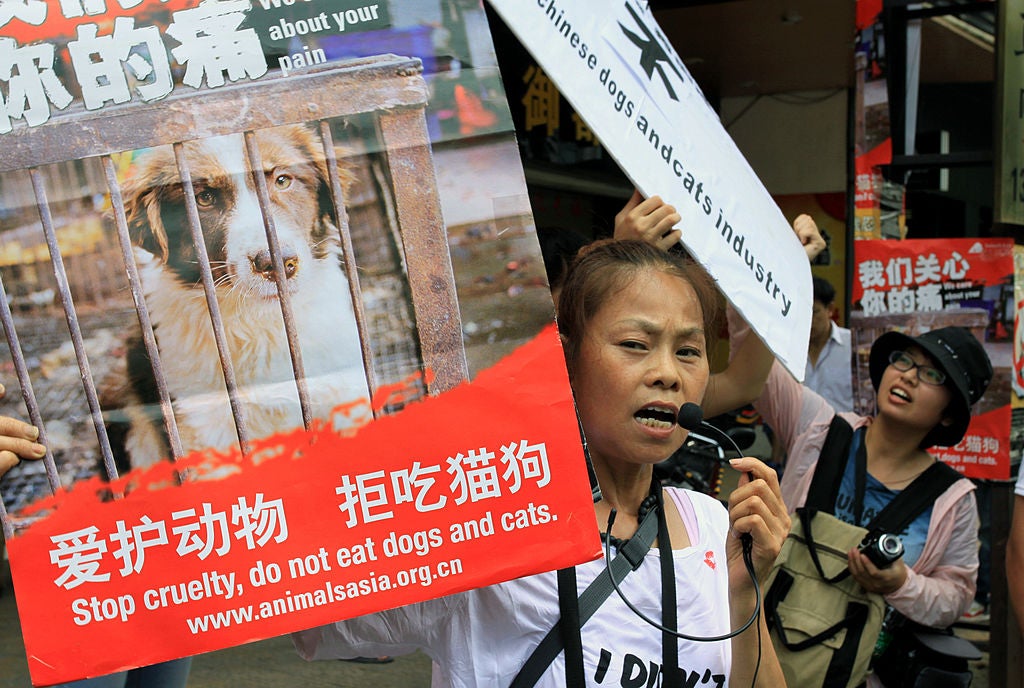Yulin Festival: Animal rights activists rescue 1,000 dogs and cats ahead of controversial annual meat market
It has been described as one of the country's biggest rescue efforts to date

Your support helps us to tell the story
From reproductive rights to climate change to Big Tech, The Independent is on the ground when the story is developing. Whether it's investigating the financials of Elon Musk's pro-Trump PAC or producing our latest documentary, 'The A Word', which shines a light on the American women fighting for reproductive rights, we know how important it is to parse out the facts from the messaging.
At such a critical moment in US history, we need reporters on the ground. Your donation allows us to keep sending journalists to speak to both sides of the story.
The Independent is trusted by Americans across the entire political spectrum. And unlike many other quality news outlets, we choose not to lock Americans out of our reporting and analysis with paywalls. We believe quality journalism should be available to everyone, paid for by those who can afford it.
Your support makes all the difference.Chinese animal rights activists have rescued 1,000 dogs and cats on the eve of the annual Yulin dog meat festival.
The rescue was carried out by local groups affiliated to the Humane Society International (HSI), which reported that the animals were tightly packed into cages in a truck heading to a slaughterhouse.
HSI say that the truck originated in the southern Gansu province, an area associated with dog theft, and was intercepted in Guangzhou after travelling 1,948km. Activists involved in the rescue reported that the animals were starving and wailing in distress with disease spreading rapidly in the confined conditions.
Activists negotiated with the truck driver to release the captive animals and provided them with water and aid. They reported that the truck driver did not have health certificates for the dogs, which Chinese animal transport regulations require for each animal, and urged local police to enforce China’s animal disease control laws.
The surviving dogs on the truck were said to display behaviours commonly found in companion animals. The various breeds of the dogs on the truck also suggested that they had been pets and were not raised to be killed for their meat.
Dr Peter Li, Humane Society International’s China policy specialist, said: “This was an audacious rescue, the single largest dog and cat truck rescue that we’ve seen so far in China. We applaud the brave work of the men and women animal lovers who saved the lives of these terrified animals who were headed towards a brutal slaughter.
“What has made this rescue of far-reaching significance is that hundreds of young people from Guangzhou, the once so-called ’world capital of dog and cat meat consumption,’ have participated in the rescue.
“These young activists are the hope of a new China that will be free of the dog meat trade cruelty.”
Li said that the cats and dogs were not headed to Yulin festival, but that the rescue the day before the annual event highlighted the fact that 10 to 20 million dogs and four million cats a year were killed for human consumption in China.
The Yulin Lychee and Dog Meat festival has taken place annually in the city since 2009. During the 10-day festival it is estimated that around 10,000 dogs and cats are eaten. It is not illegal to eat dogs or cats in China but the festival attracts international and domestic opposition each year.
Join our commenting forum
Join thought-provoking conversations, follow other Independent readers and see their replies
Comments